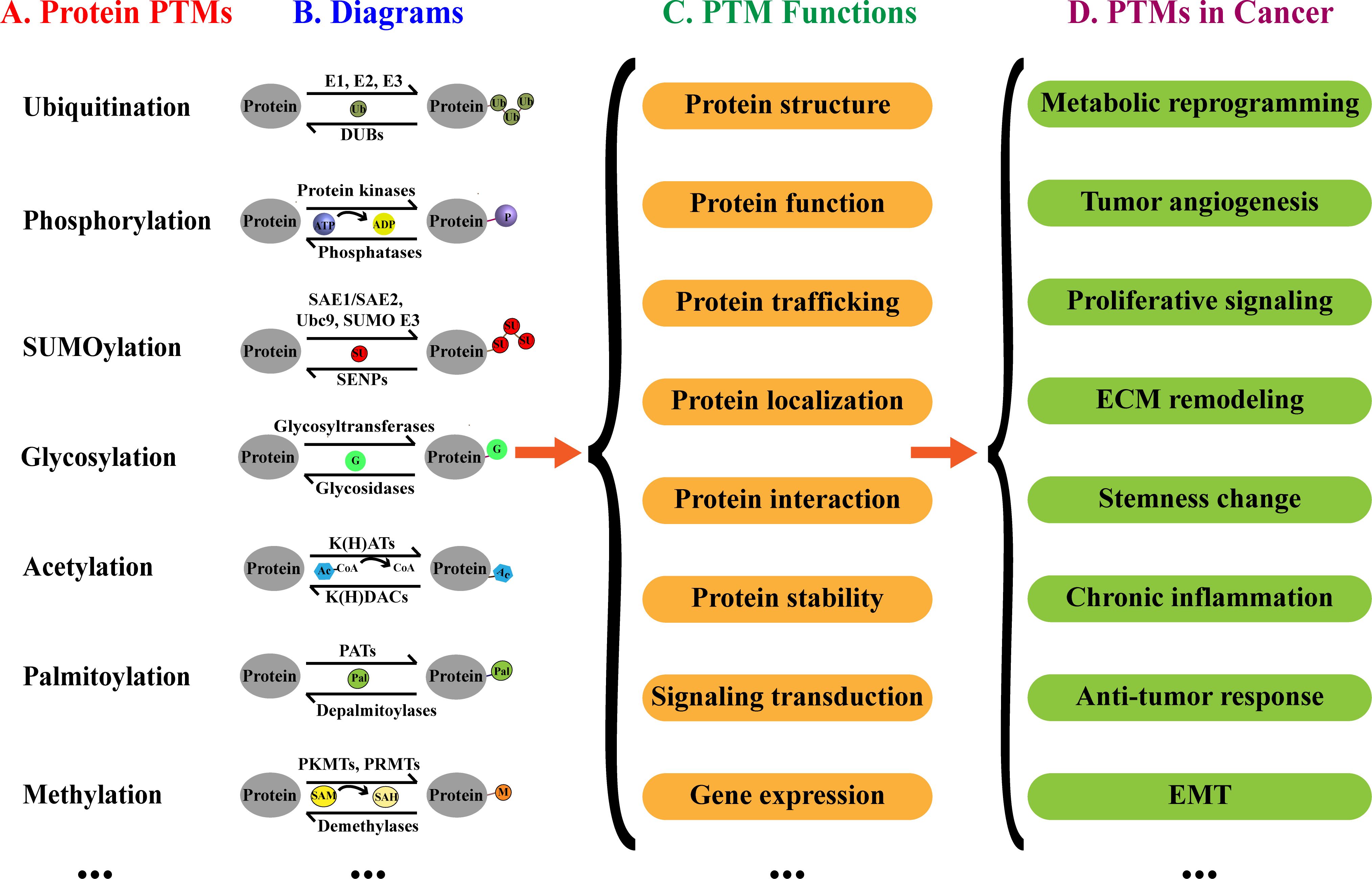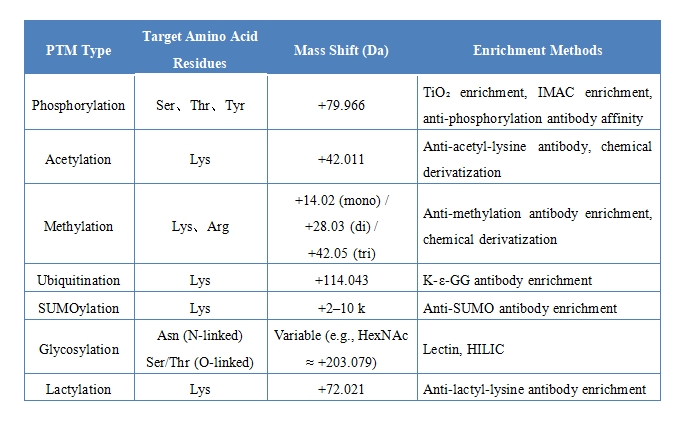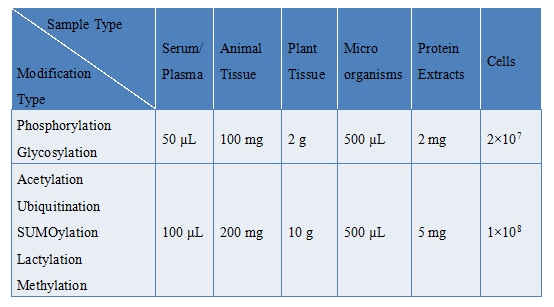Protein PTM Qualitative Analysis Service
Protein PTM qualitative analysis focuses on the qualitative identification of post-translational modifications (PTMs) in proteins, aiming to accurately detect and localize various types of modifications such as phosphorylation, acetylation, methylation, and glycosylation. By leveraging high-resolution mass spectrometry technologies (such as LC-MS/MS and MALDI-TOF) in combination with specific enrichment strategies, this service enables comprehensive analysis of modification sites, types, and distribution, providing critical data to support studies on protein functional regulation.
Protein PTM qualitative analysis service is widely applied in areas such as signal transduction, metabolic regulation, cancer research, neurodegenerative diseases, and drug target screening. This service helps researchers gain deeper insights into the role of PTMs in disease mechanisms, supports drug mechanism validation and target discovery, and provides essential data for systems biology research.

Zhu, Q G. et al. Frontiers in Oncology, 2024.
Figure 1. Protein PTMs and Biological Functions.
Services at MtoZ Biolabs
1. Targeted Protein PTM Qualitative Analysis
MtoZ Biolabs utilizes a high-resolution LC-MS/MS platform to perform precise qualitative analysis of post-translational modifications (PTMs) on specific target proteins. By identifying modification types and site distributions, this service helps researchers gain deeper insights into how PTMs affect protein function, conformation, and molecular interactions.
2. PTM Proteomics Qualitative Analysis
By integrating modified peptide enrichment strategies with advanced mass spectrometry detection, MtoZ Biolabs achieves large-scale identification of PTM types across the entire proteome. This service systematically reveals modification profiles, providing comprehensive data support for signaling pathway analysis and regulatory mechanism studies. The common types of modifications include the following:

Analysis Workflow
1. Protein Extraction and Digestion
Target proteins are extracted from cells, tissues, or purified protein samples. Appropriate proteases are selected based on the target proteins to generate peptides suitable for mass spectrometry analysis while preserving post-translational modification (PTM) information.
2. Modified Peptide Enrichment
Depending on the PTM type, enrichment strategies such as TiO₂, IMAC, antibody affinity, or chemical derivatization are employed to improve detection of low-abundance modified peptides and reduce background interference.
3. Mass Spectrometry Analysis
High-resolution mass spectrometry platforms are used to perform LC-MS/MS analysis, acquiring mass data of peptides for qualitative identification of modification types and sites.
4. Data Interpretation and Annotation
Spectral matching, PTM site localization, and confidence scoring are performed using specialized databases and algorithmic tools. Final outputs include identified modification types, site distribution, and functional annotations.

Figure 2. The Workflow of the Protein PTM Qualitative Analysis.
Sample Submission Suggestions
1. Sample Type and Amount

2. Buffer Requirements
Avoid using components such as SDS, DTT, glycerol, or EDTA, which may interfere with enzymatic digestion or mass spectrometry analysis.
3. Sample Storage and Transportation
Samples should be stored at –80°C to prevent degradation or loss of modifications due to repeated freeze-thaw cycles. Dry ice should be used during transportation. For liquid samples, lyophilization or concentration prior to submission is recommended to enhance stability.
Service Advantages
1. High-Sensitivity Identification
Leveraging advanced high-resolution mass spectrometry platforms combined with optimized sample preparation workflows, this service enables accurate identification of low-abundance post-translational modification (PTM) sites, suitable for in-depth analysis of complex biological samples.
2. Broad PTM Type Coverage
Supports qualitative detection of a wide range of common PTM types, including phosphorylation, acetylation, methylation, ubiquitination, SUMOylation, and lactylation, to meet diverse research needs.
3. Specialized Enrichment Strategies
Employs high-efficiency enrichment methods such as TiO₂, IMAC, and antibody affinity purification tailored to specific PTM characteristics, enhancing the detection rate and accuracy of modified peptides.
4. Visualized Data Output
Delivers visual reports containing modified peptide sequences, site localization, and spectral illustrations, helping researchers clearly interpret PTM distribution and potential biological functions to support downstream analysis.
Applications
1. Signal Transduction Mechanism Research
By identifying protein modification sites under different conditions, this service helps elucidate functional changes involved in kinase activation, transcriptional regulation, and other signal transduction pathways.
2. Disease Mechanism Exploration
Protein PTM qualitative analysis service can uncover abnormal modification patterns associated with cancer, autoimmune disorders, and neurodegenerative diseases, revealing key regulatory mechanisms in pathological processes.
3. Drug Mechanism Validation
By comparing PTM profiles before and after treatment, the service evaluates how drugs affect target protein function and signaling pathways, aiding in target validation.
4. Biomarker Discovery
Protein PTM qualitative analysis service facilitates the identification of proteins with specific modifications in early-stage disease or particular physiological conditions, providing potential biomarkers for clinical diagnosis and personalized therapy.
FAQ
Q1: Can the Service Identify Specific Modification Sites?
A1: Yes. We utilize high-resolution mass spectrometry platforms (such as Orbitrap) combined with advanced algorithms to achieve site-specific identification of modified peptides.
Q2: Is Enrichment of Modified Peptides Required?
A2: Enrichment is generally recommended (e.g., TiO₂, IMAC, or antibody-based affinity methods) to enhance the detection of low-abundance modifications and improve data quality and coverage.
Q3: Can Qualitative Analysis Be Combined with Quantitative Analysis?
A3: If quantification is needed, we also offer PTM quantitative analysis services using TMT, iTRAQ, Label-Free, and other quantification strategies.
Deliverables
1. Comprehensive Experimental Details
2. Materials, Instruments, and Methods
3. Total Ion Chromatogram & Quality Control Assessment (project-dependent)
4. Data Analysis, Preprocessing, and Estimation (project-dependent)
5. Bioinformatics Analysis
6. Raw Data Files
Related Services
Post-translational Modifications (PTMs) Service
Post-Translational Modifications Proteomics Service
How to order?







